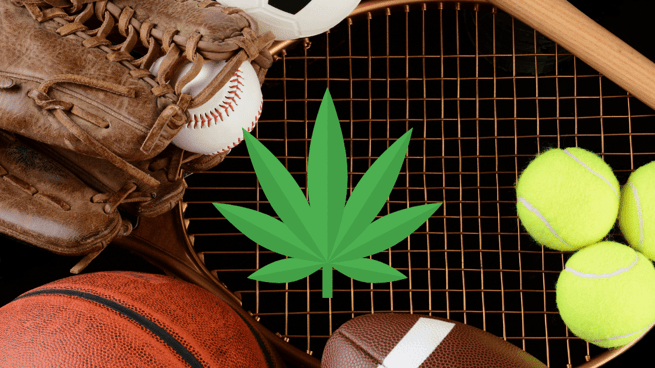In recent years, the conversation surrounding cannabis use in sports has gained significant momentum. What was once a taboo topic has evolved into a subject of increasing interest and exploration. Athletes, both professional and amateur, are now questioning the effects of cannabis on performance, recovery, and overall well-being. As attitudes towards cannabis shift, a growing body of research is shedding light on its potential benefits and challenges in the athletic arena.
From Prohibition to Nuanced Approaches: Changing Regulations on Cannabis Use
Historically, cannabis has been classified as a prohibited substance in most sports organizations due to its psychoactive compound, delta-9-tetrahydrocannabinol (THC). The World Anti-Doping Agency (WADA), which sets the anti-doping regulations for the Olympics and many other sports, included cannabis on its prohibited list for years. However, recent changes in regulations have signaled a more nuanced approach to cannabis use in athletics.
One of the main reasons behind this shift is the changing public perception of cannabis. As many countries and states around the world are legalizing or decriminalizing cannabis for medical and recreational use, attitudes towards its use have become more lenient. This changing landscape has prompted sports organizations to reevaluate their policies and consider the potential benefits and risks associated with cannabis use.
Athlete Perspectives: Advocacy and Experiences with Cannabis Use
Several notable athletes have openly discussed their cannabis use, contributing to the ongoing conversation surrounding its potential benefits and challenges. One such athlete is retired NBA player Al Harrington, who has become an advocate for cannabis use in sports. Harrington has spoken openly about how cannabis helped him manage pain during his career and now advocates for its medicinal properties and the need for more research in the sports community. Another notable athlete is Megan Rapinoe, a U.S. women's soccer star. Rapinoe has been an advocate for cannabis legalization and has spoken about using CBD products to aid in her recovery and manage the physical demands of being a professional athlete.
Progressive Leagues: Sports Organizations Relaxing Cannabis Restrictions
Several sports leagues have taken steps to allow or relax restrictions on cannabis use in athletes. One notable example is the National Football League (NFL), which revised its policy in 2020 to reduce penalties for positive cannabis tests and to focus more on treatment and player well-being. The league acknowledges the potential therapeutic benefits of cannabis and has shifted its approach to prioritize player health rather than imposing strict disciplinary measures. Another league is the National Basketball Association (NBA), which has become more lenient regarding cannabis use. In 2020, the league announced that it would no longer randomly test players for recreational drugs, including cannabis, during the regular season. This change reflects a recognition of evolving societal attitudes towards cannabis and a desire to focus on player wellness rather than punitive measures.
Additionally, sports leagues such as Major League Baseball (MLB) and Major League Soccer (MLS) have also adjusted their drug policies to be less restrictive towards cannabis, emphasizing treatment and rehabilitation over punishment. These progressive steps demonstrate a growing acceptance of cannabis use in certain sports leagues, reflecting a desire to prioritize player health and adapt to changing societal norms.

Pain Management Potential: Cannabis as an Alternative to Traditional Medications
For athletes, cannabis may offer several potential advantages. One of the primary areas of interest is pain management. Athletes frequently face injuries and chronic pain resulting from rigorous training and competition. Traditional pain medications, such as opioids, carry the risk of addiction and adverse side effects. Cannabis, particularly cannabidiol (CBD), a non-psychoactive compound found in the plant, has shown promise in relieving pain and inflammation without the addictive properties of opioids.
Challenges and Concerns: Cognitive and Motor Impairment
Despite the potential benefits, there are challenges associated with cannabis use in sports. One of the primary concerns is the impact on cognitive and motor functions. THC, the psychoactive compound in cannabis, can impair reaction time, coordination, and decision-making abilities, which are crucial for athletic performance. This raises concerns about safety and fair play, especially in sports where split-second decisions and precision are paramount.
Fairness and Standardization: Testing and Dosing Protocols for Cannabis
Moreover, the lack of standardized testing and dosing protocols for cannabis poses challenges in implementing fair policies. The detection window for cannabis is much longer than that of most other substances, making it difficult to determine if an athlete used cannabis for performance enhancement or recreational purposes. Additionally, individual responses to cannabis can vary widely due to factors such as metabolism and tolerance, further complicating the issue of determining fair usage.
The Need for Further Research: Understanding the Effects of Cannabis in Athletics
As the landscape of cannabis use in sports continues to evolve, more research is needed to better understand its effects on athletic performance, recovery, and long-term health. Rigorous scientific studies are essential to provide athletes and sports organizations with evidence-based guidelines and policies regarding cannabis use.
Education and Awareness: Empowering Athletes and Sports Professionals
In the quest for a balanced approach, education and awareness play a crucial role. Athletes need to be educated about the potential benefits and risks associated with cannabis use, enabling them to make informed decisions about their well-being and performance. Coaches, trainers, and sports medical professionals also need to stay up-to-date with the latest research to provide accurate information and guidance to athletes.
Breaking the Stigma: Promoting Open Discussions on Cannabis Use in Sports
Open and honest discussions about cannabis use in sports are necessary to break down the stigma and promote a culture of understanding. By encouraging dialogue, athletes can share their experiences, challenges, and concerns, fostering an environment that supports their well-being and ensures fair play.




